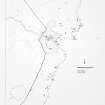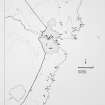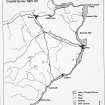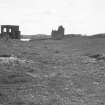Ackergill Tower
Tower House (Medieval)
Site Name Ackergill Tower
Classification Tower House (Medieval)
Alternative Name(s) Wic 133
Canmore ID 9145
Site Number ND35SE 16
NGR ND 35284 54669
Datum OSGB36 - NGR
Permalink http://canmore.org.uk/site/9145
- Council Highland
- Parish Wick
- Former Region Highland
- Former District Caithness
- Former County Caithness
ND35SE 16.00 3528 5466
(ND 3521 5459) Dovecot (NAT)
(ND 3529 5454) Dovecot (NAT)
OS 6" map, Caithness, 2nd ed., (1905)
(ND 3528 5466) Ackergill Tower (NR)
OS 6" map, (1968).
ND35SE 16.01 ND 3517 5440 Cottage
ND35SE 16.02 ND 35208 54590 Dovecot
ND35SE 16.03 ND 35297 54549 Dovecot
ND35SE 16.04 ND 35176 54727 Stables
ND35SE 16.05 ND 35228 54669 Walled Gardens
Ackergill Tower is a massive rectangular keep, built about 1500 and still occupied. Its site has no positional strength, but it was, according to Tranter (1962-70), surrounded by a moat, 12ft in width and depth, of which no trace remains.
Five storeys in height, the tower measures 48 by 34ft, its walls being about 10ft thick. The top storey, with its cope-house and battlements, was renewed in the mid-19th century, when the tower's windows and doors were also enlarged. The present entrance is by an arched doorway on the NW side. Outbuildings on the E, W and N are modern, although 'a new house lately built' between the tower and the sea is referred to in 1726. To the 18th century also belong the two lean-to dovecots S of the tower.
The property belonged to the Cheyne family until 1354 when it passed by marriage to the Keiths, the Earls Marshall, who held it until at least 1556, although when the tower first appears on record in 1510 it is said to be captained by Gilbert Mowat of Brabstermyre. The tower appears to have been in the possession of the Sinclair Earls of Caithness in the early 17th century, and to have been garrisoned by Cromwellian troops in 1651. By 1726 it had come into the possession of the Dunbars of Hempriggs by whom it is still owned.
RCAHMS 1911, visited 1910; N Tranter 1962-70.
The tower is generally as described. The two dovecots are almost identical, each being 9 by 5m.
Visited by OS (R D L), 21 June 1963.
Ackergill Tower is generally as described by the previous authorities. The arched doorway is in the SW. A print in the Tower dated 1821 shows a crenellated four storey tower without copehouse and modern wings. Revised at 1:2500.
Visited by OS (J B), 18 September 1982.
Plate XLVI - carved stones from Castle Sinclair, now at Ackergill Tower
Plate XLIX - Supporters of Arms from Castle Sinclair now at Ackergill Tower
Reference, Scotland's Magazine (SMT), November 1952, p.34.






























































































































































































